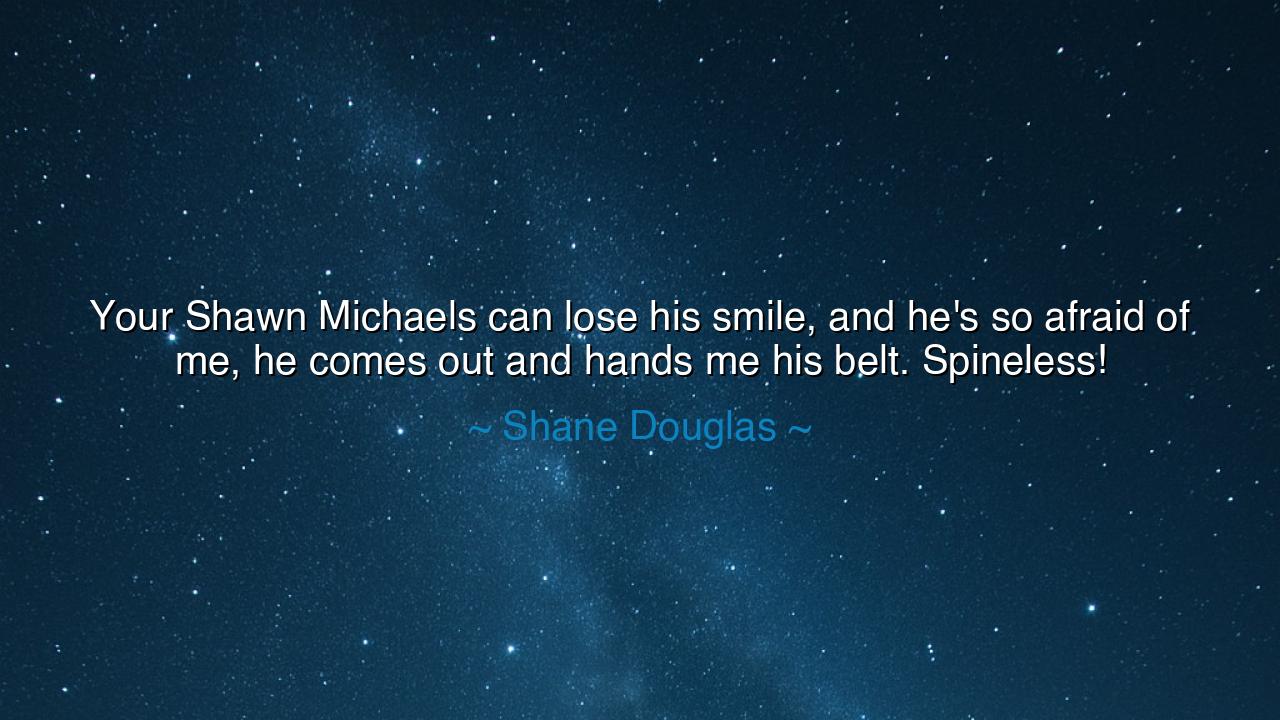
Your Shawn Michaels can lose his smile, and he's so afraid of me
Your Shawn Michaels can lose his smile, and he's so afraid of me, he comes out and hands me his belt. Spineless!






Hearken, O seeker of wisdom, and reflect upon the words of Shane Douglas: “Your Shawn Michaels can lose his smile, and he's so afraid of me, he comes out and hands me his belt. Spineless!” Within this fiery declaration lies a meditation on courage, presence, and the weight of fear. It reminds us that even those famed for charisma and skill can falter when confronted with true intimidation, and that courage and conviction are revealed in moments of challenge.
Since the earliest days, philosophers and generals recognized that fear can undo even the strongest of spirits. Sun Tzu, in The Art of War, warned that an enemy’s countenance reveals not just intent but vulnerability, and that the truly courageous act decisively even in the face of threat. Douglas’ insight mirrors this timeless truth: a smile may conceal anxiety, and the facade of confidence may crumble when confronted with genuine intimidation or pressure.
Consider the life of Alexander the Great, who faced countless adversaries and treacherous situations. Even the bravest generals sometimes wavered in his presence, surrendering ground or yielding to his strategic superiority. The strength of character, or lack thereof, became evident not in peace, but in moments of confrontation. Like Douglas’ observation of Michaels, history shows that fear exposes truth, and that courage is as much about heart as it is about skill.
There is a subtle heroism in recognizing and confronting fear. To act decisively while others falter requires mastery of self, clarity of purpose, and the ability to remain steadfast under pressure. The ancients revered those who could stand firm, assert authority, and face intimidation without relinquishing conviction. Douglas’ words remind us that spinelessness is not merely physical, but a surrender of will, and that true respect arises from courage and presence.
Even in modern history, this principle manifests vividly. Winston Churchill, in the darkest days of the Second World War, faced leaders and armies that might have intimidated lesser men. Yet he maintained composure, resolve, and assertiveness, demonstrating that courage, conviction, and steadfast presence command respect and shape outcomes. Douglas’ observation of Michaels mirrors this reality: those who cannot stand firm reveal the fragility of their character.
The lesson is clear: fear will test every person, no matter their skill or renown. A smile may mask doubt, but it cannot shield weakness when confronted with pressure or authority. To cultivate strength of character, one must embrace courage, act decisively, and resist the temptation to surrender when challenged. True presence and bravery are earned through consistency in the face of intimidation.
From this reflection, practical counsel arises: observe both your own reactions and those of others under pressure. Strengthen courage through preparation, self-awareness, and moral clarity. Stand firm, even when fear whispers, and act with conviction; in doing so, one ensures that the spirit remains unyielding, and respect is earned not through facade but through demonstrated bravery.
Thus, let each heart carry this ancient truth: character is forged in confrontation, and fear reveals what words alone cannot. Shane Douglas reminds us that even the most celebrated may falter when courage is absent, and that the truest victory lies in steadfastness, decisiveness, and the refusal to yield. In embracing bravery, one shapes destiny, commands respect, and transforms challenge into triumph.
If you wish, I can also craft a short, audio-ready version of this reflection, rhythmically structured with natural rises and pauses to make it engaging and evocative for narration. Do you want me to create that version?






AAdministratorAdministrator
Welcome, honored guests. Please leave a comment, we will respond soon